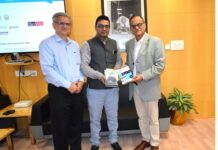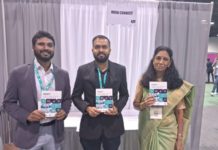
The ‘National symposium on Nutraceuticals, Herbals and Functional Foods’ was organized by the knowledge chamber, The Associated Chambers of Commerce and Industry of India (ASSOCHAM) on July 22, 2015 at New Delhi.
Speaking on the occasion, the health minister in Delhi government, Mr Satyendra Jain mentioned that the state government would be opening a thousand clinics in a year mostly in slums where the emphasis will be in protecting health and improving immunity through better nutrition and health supplements. He recalled that in the three clinics the Delhi government opened recently in the slums, majority of patients was women. Out of them 80 per cent were found suffering from high deficiency in hemoglobin.
The ASSOCHAM-RINCOS knowledge paper on nutraceuticals, herbals and functional foods was also released at the seminar. The event was attended by close to 300 participants including academicians, industry leaders, students and activists. Besides various sessions that saw presentations and discussions, there were question answer sessions between participants and panellists.
“The market for these is restrained by lack of a solid regulatory framework which is crucial for medical credibility as it ensures high quality products”. The paper revealed that the US alone has 36 per cent of the global market for these with Asia-pacific rising to 30 per cent. Japan is a major consumer with 14 per cent and China 10 per cent,” mentioned Mr D S Rawat, secretary general, ASSOCHAM.
Taking on this theme, Dr H K Chopra, chief cardiologist at Moolchand Medicity and co-chairman of ASSOCHAM national Council of Healthcare and Hospital , emphasized that healthcare was more important than medicare. “In public health programmes, the emphasis should shift from illness to wellness. This would save millions of people from later diseases. Over 90 per cent of people above 60 years of age suffered from nutritional deficiency. It was very important that more than pharmaceuticals the people needed nutraceuticals (nutritional supplements),” he said.
The symposium revealed huge market that was opening up in the country for nutritional materials and herbals. Dr B K Rao, chairman, ASSOCHAM National Council of Healthcare and Hospital and former chairman of Sir Ganga Ram Hospital revealed that the nutraceuticals and herbals market in India would be 4 billion USD by 2018 with a compound growth rate of 18 per cent. He regretted the lack of clarity in regulatory structure in this sector with lot of claims, counter-claims and myths cluttering the prospects.
Among others who spoke at the symposium Mr P K Jain, chairman of ASSOCHAM MSME Council said, Andhra, Tamil Nadu and West Bengal were emerging as the main centres of production of nutraceuticals and herbals production. All big pharmaceutical companies were now moving into production of these.
Detailing the holistic treatment needed for better health through nutraceuticals, Mr Shishmul Maheshwari, founder and CEO of RNCOS stressed the preventive quality of these materials. The huge change in healthcare that probiotic materials brought about in Japan, Mr Minoru Shimada, MD of Yakult Danone India recalled the history of this growth.
During the first plenary session, the panel discussed R&D innovations in nutraceuticals and Indian regulatory norms in sync with global standards. Moderated by Mr Shushmul Maheshwari, founder and CEO, RNCOS, the discussion was on various aspects pertaining to current scenario.
Mr Arun Kelkar, managing director, Hexagon Nutrition India gave a talk on effective introduction of herbals in functional foods. Ms Vani Bhambri Arora, deputy director, Quality Council of India gave insights on enhancing product acceptability through accredited third party conformity assessment system.
“Innovations in nutraceuticals and functional foods-contribution from the R&D,” was the topic of talk given by Mr V Hariharan, CEO and MD, Phytotech Extracts. He mentioned about the guidelines for nutraceuticals prepared by World Health Organization (WHO). He elaborated, “Selecting right dosage forms is very important. Deeper in-vitro and in-vivo studies are required.” Nutragenomics addresses the role in genes. Development of personalized foods and DNA diet. Infact here genes decide what should we eat.”
Dr Shilpi Sharma, associate professor, Department of Biochemical Engineering & Biotechnology, Indian Institute of Technology, Delhi took the participants through safety and efficacy issues in probiotics. “There are 3-5 pound microbes sitting in our gut. This is interesting becasue it shows their importance in our lives.”
The second plenary session is focussed on analysing Indian nutraceutical sector, pin point issues and find probable solutions.
Well known consumer rights protection activist, Mr Bejon Misra, founder and director, Partnership for Safe Medicines India spoke on safety and consumer perspective for nutraceuticals in India. “This is a serious business that has everything to do with the people. Product liability act is missing,” he cautioned the companies.
Mr Kaushik Basu, EVP Food and Agri Business, Yes Bank while speaking on medicinal and aromatic plant Indian market scenario, pointed towards the rapid urbanization, deforestation, low levels of standard technology and quality of crop seeds. He was critical of the lack of enough promotion. In his presentation, Mr Anil Joshi, CEO, GCV Life talked about need for innovations in this field.































































